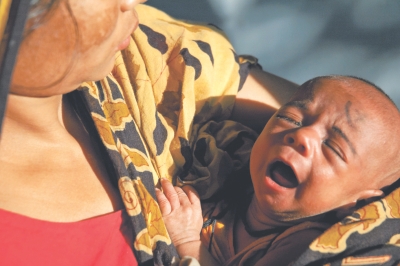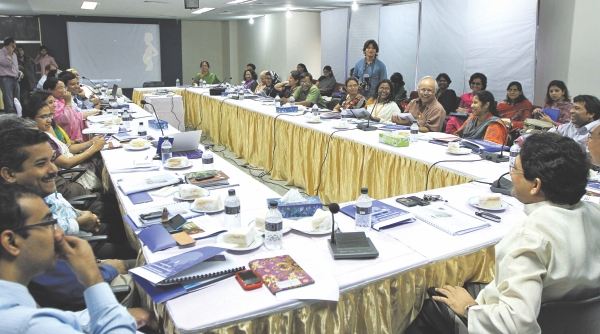| Home - Back Issues - The Team - Contact Us |
 |
| Volume 11 |Issue 10| March 09, 2012 | |
|
|
Health An Unhealthy Budget Sharmin Ahmed
It has not been long since Prime Minister Sheikh Hasina received the UN award for Bangladesh's outstanding achievements in attaining the Millennium Development Goals (MDG), particularly in reducing the child mortality rate. But the question that remains is–what is being done for the mother? Or is the adage of a healthy mother providing a healthy nation redundant? The maternity mortality ratio is defined as the number of maternal deaths per 100,000 live births, and indicates the risk of maternal death among pregnant women and those who have recently given birth. According to Bangladesh Maternal Mortality and Health Care Survey (BMMS) the rate is around 194 and the target is to reduce it to 147 by 2015. But what is more alarming is that over 90 percent of child births in Bangladesh happen under the care of traditional or local birth attendants–old women, relations, dias (untrained hired birth attendants). This results in high death rates for mothers during or soon after delivery because both mother and family members are usually ill educated in the methods of looking after pregnant women. Moreover, they are poor so they cannot afford to provide the necessary health assistance and resort to such inefficient methods. At a roundtable discussion organised by White Ribbon Alliance, Bangladesh (WRA,B) and The Daily Star, Professor Abul Barkat, Chairperson of Department of Economics, University of Dhaka said; "The direct answer to this question is No." He refers to a recent study, 'Allocation of funds for Maternal Health in Bangladesh: A Historical Perspective' conducted by Human Development Research Centre (HDRC). The study revealed among others, that four million women received some type of maternal healthcare, whereas 5.4 million did not in 2009. According to the World Health Organization (WHO), maternal healthcare is defined as 'A quality service provided to a woman during pregnancy, delivery and post-delivery period.' 'An information Kit for Advocacy on Maternal, Newborn and Child Health,' by White Ribbon Alliance, Bangladesh an international coalition of organisations to increase public awareness, stated that most common causes of maternal death may be related to a three-dimensional delay in decision making, transport and receiving care. It is often the case that beliefs, local traditions and socio-economic background cause delay in taking decisions to seek health care and often such delays prove to be fatal.
Even if a decision is taken in time, transport might not be available to take the woman to a health centre or the distance might result in a fatal delay. Often, despite reaching the health centre, the patient may not find a qualified health care provider or life saving drugs to save her. Other causes of maternal mortality consist of violence like physical abuse, adolescent fertility, harmful or unhygienic practices before, during and after pregnancy. The government of Bangladesh is committed to achieve the MDG-5 goal of reducing maternal mortality ratio by three-fourths of its level in 1999. According to the estimate of the study, only Tk 175 crore was allocated for maternal healthcare in 2009-10 fiscal. "The allocation is only 2.5 percent of the total budget of the health and family welfare ministry and only 0.15 percent of the national budget," said Professor Barkat, adding that a little more than half of this allocation was spent directly for maternal healthcare services. Professor Barkat, who is also chief adviser to HDRC, explained that Tk 411 crore is required to provide maternal healthcare in the present situation, while Tk 820 crore is needed to ensure an improved service in an ideal situation. At a round table discussion based on the study he opined, "Maternal healthcare services should be treated as basic public entitlement in the Constitution, the national budget is not prepared in line with the Millennium Development Goals (MDG)." At the discussion, the question of if it indeed was a realistic expectation to generate so much money to this section of the budget, given the lack of fiscal or budgetary space, was brought up. Professor Barkat on that note explained that budgetary space is rather relatively apportioned. In many instances less important sectors are given more priority because of a more powerful political interest in it. Terming the government's nutrition programme a failure, he stated that Tk 1,478 crore was allocated for family planning programme in 2009-10 fiscal, but none of the programmes are directly related to maternal health despite clear indications that this sector is in dire need of more budget space. Dr Abu Jamil Faisel, country representative of Engender Health, moderated the open discussion and he reiterated the statement stressing on the fact that the conditions of mothers in Bangladesh is very alarming. He explained that when a mother dies there are significant social and economic losses. It is an unpredictable loss to the livelihood of the household and which likely leads to intensification of poverty. With the mother's death, effective care of surviving children and other household members is reduced. The responsibility falls on either elderly relatives or young siblings thus their vulnerability also increases. Professor Tahera Ahmed of North South University who was also at the discussion said, "Almost all of the maternal deaths, most of which occur with adolescent mothers, are preventable by awareness and through assistance from trained health workers." Md Abdullah, a retired joint secretary and presently senior consultant to HDRC, said, "Efficiency and transparency of the health ministry is vital for spending increased allocation for maternal healthcare. Therefore a separate Operational Plan (OP) for Maternal Health is necessary so that it can be separately monitored too." Professor Barkat also suggested that.."The government should estimate exactly how much fund is allocated for maternal healthcare and what is required to increase allocation to achieve the MDG," explaining that a separate operational plan for maternal healthcare is vital in the five-year programme on Health, Population and Nutrition. Three lawmakers Shammi Akhter, Nazma Akhter and Golam Mowla Roni present at the round table promised to raise the issue in parliament and help ensure the service at their respective constituency. Whether that is something we can be hopeful about is another debateable question. Copyright
(R) thedailystar.net 2012 |

